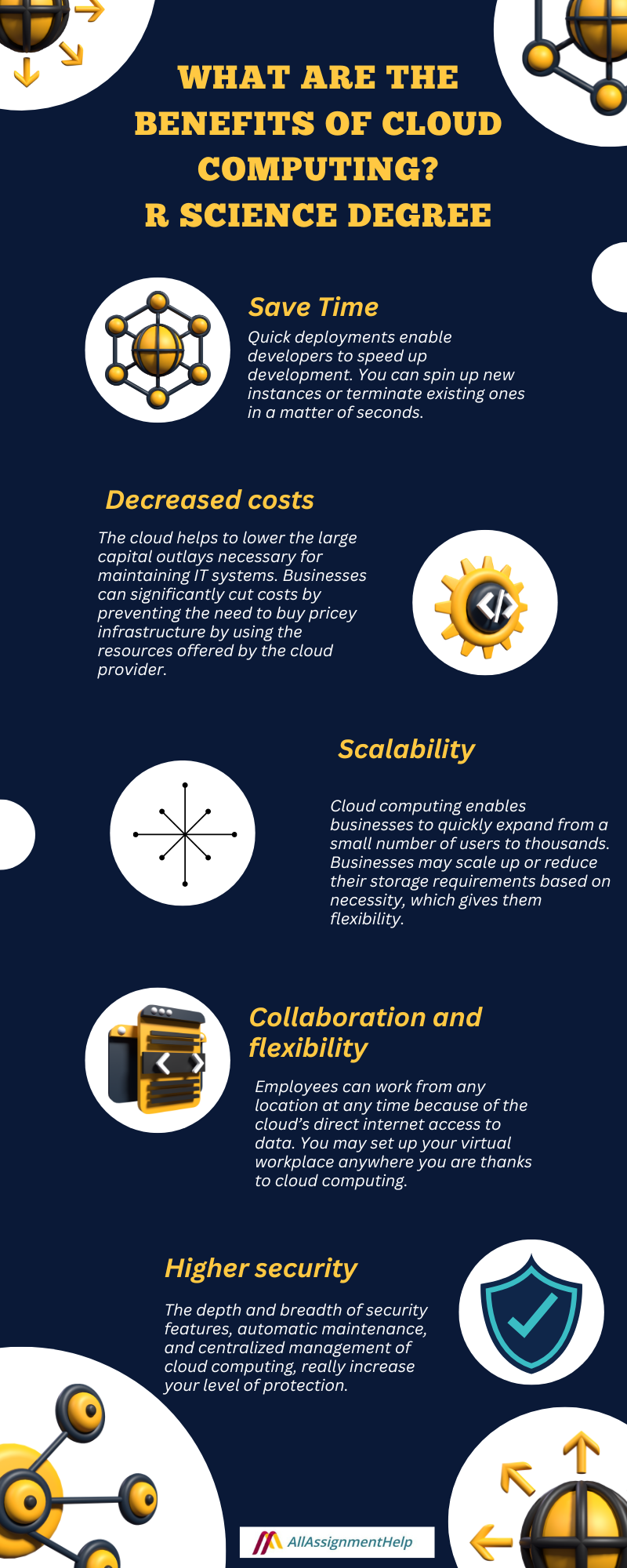Table of Contents
The term cloud computing refers to the application of internet-based hosted services, including networking, servers, databases, software, and data storage. The number of cloud-based IT services and applications has increased dramatically since the advent of cloud computing and is still growing. We can save time, money, and storage space because almost all our applications are cloud-based. This blog which is composed by an expert at allassignmenthelp, covers several kinds of cloud computing and its benefits. So stay tuned….
What is Cloud Computing?
When hardware, storage, databases, networking, and software are made available on demand to companies and individuals over a network, known as cloud computing. Without needing to manage their own physical devices or IT infrastructure, cloud computing allows enterprises to access and store information.
In simple words, the internet is referred to as the cloud. Businesses are said to be functioning in the cloud when they store data in virtual data centres or use an internet connection to access programs rather than depending on the hard drive or on-premises IT infrastructure of their devices.
A serverless workload that is infinitely scalable and geo-redundant can be as basic as “servers in a third-party data centre” or as complex as whole serverless workloads. Cloud services and servers are elastic and scalable.
It’s undeniable that students enrolled in online computing courses have a busy year ahead of them. Generally speaking, a significant portion of these academics believe it is too demanding to handle everything. Online class help is always available from sincere classdoers to relieve their tension. During their online computer course, they can benefit from this expert service at a reasonable rate and maintain a good study-life balance.
Types of Cloud Computing
The deployment model or the kind of service can be used to categorize cloud computing. We can categorize clouds as public, private, or hybrid clouds depending on the particular deployment model. Furthermore, depending on the services the cloud model provides, it can be categorized as platform-as-a-service (PaaS), software-as-a-service (SaaS), or infrastructure-as-a-service (IaaS).
- IaaS: On-demand access to networking, storage, processing, and virtualization is known as infrastructure as a service, or IaaS.
- PaaS: Platform as a service (PaaS): the hardware and software resources required for the development of cloud applications
- SaaS: Software as a service (SaaS) is the provision of the entire application stack as a cloud service, including upkeep and administration of the application software and supporting infrastructure.
Read Also: Online Exam Fear: How to Stay Focused and Confident?
How Does Cloud Computing Work?
Supplying computer resources via the internet, like data centres or IT infrastructure, is known as cloud computing. By using this strategy, companies can avoid the expense and hassle of developing and managing their own data centre or IT infrastructure by renting software or storage space from a cloud service provider. Paying for just the resources they need is a significant advantage of adopting cloud computing services for businesses.
Cloud computing activities are separated into frontend and backend components for easier technical understanding. Whether utilizing a cloud computing application or an internet browser, the frontend component gives users access to data and applications that are stored in the cloud. Computers, servers, and databases that hold the data make up the backend.
Top Common Uses of Cloud Computing
All types of organizations, including startups, huge enterprises, and government agencies, use cloud computing to access technological services that improve productivity, communication, workflow efficiency, and service delivery, among other things. Some of the most popular applications for cloud computing are listed below.
Web apps
In today’s corporate world, web applications are an essential tool. Anyone with a web browser can access web-based apps, which are powered by cloud technology and offer rapid remote access to information. This enables business professionals to cooperate with colleagues from any location to interact with clients and deliver them the necessary information while they’re on the go.
Storage
File storage is among the most popular applications of cloud computing. Cloud storage allows organizations to easily access data from anywhere on any device with an internet connection. There are many other ways to store and access data, including USB drives, external hard drives, and PC hard drives. Cloud storage services, such as DropBox, OneDrive, and Amazon S3, offer enterprises secure data access and the ability to scale up or down storage capacity according to their needs.
Database
Another common commercial application is the cloud database. A cloud database is “a database service built and accessed through a cloud platform. With extra features like flexibility, cost savings, failover support, specialist knowledge, and more, a cloud database offers nearly all of the features of a regular database.
As you can see, this broad sector of cloud computing has a lot to offer. You will undoubtedly have a successful professional career. To make that happen, you will have to work very hard and complete your degree as a proficient programmer. Not every student enrolled in this course manages their life and studies with the same level of proficiency. This is why using a college assignment help service can be a smart way for them to manage one of their academic responsibilities, such as assignments. These companies assist students who are having difficulty completing their tasks, and they can assist them even in cases where there is a tight deadline.
What Are The Benefits Of Cloud Computing?
The most important reason why cloud computing is growing rapidly is the various benefits it offers. It saves businesses the time and resources required to set up full-fledged physical IT infrastructure. Let’s look at all the benefits cloud offers:

Save Time
Quick deployments enable developers to speed up development. You can spin up new instances or terminate existing ones in a matter of seconds. By removing hardware constraints and sluggish procurement procedures, cloud computing facilitates the development of breakthroughs by making it simple to test concepts and create new applications.
Decreased costs
The cloud helps to lower the large capital outlays necessary for maintaining IT systems. Businesses can significantly cut costs by preventing the need to buy pricey infrastructure by using the resources offered by the cloud provider.
Scalability
Cloud computing enables businesses to quickly expand from a small number of users to thousands. Businesses may scale up or reduce their storage requirements based on necessity, which gives them flexibility.
Your company has more freedom with cloud computing. Resources and storage can be rapidly scaled up to suit business demands without requiring investments in physical infrastructure.
The infrastructure required for businesses to support their maximum load levels does not need to be built or purchased. Similarly, if resources aren’t being used, they can rapidly reduce.
Collaboration and flexibility
Employees can work from any location at any time because of the cloud’s direct internet access to data. You may set up your virtual workplace anywhere you are thanks to cloud computing. Giving teams access to the same files as outside vendors enables them to collaborate on a project even when they are in different places.
Higher security
The depth and breadth of security features, automatic maintenance, and centralized management of cloud computing, really increase your level of protection.
To offer even stronger protection, reputable cloud providers use cutting-edge technologies and top security specialists.
Automatic updates
It can take a lot of important IT staff time to manually update all company software. In contrast, cloud computing companies update and refresh their systems with new technology on a regular basis. It helps organizations have access to the newest servers, software, and processing capacity.
The main characteristics of cloud computing are aimed at giving users freedom, scalability, and affordability while enabling cloud providers to offer services that are simple to use and administer. Understanding these characteristics will help customers select the best cloud computing solutions for their purposes and more effectively evaluate the advantages and hazards of the technology.
Read Also: Opinion Essay Topics: Unique Ideas To Write About
Conclusion
The majority of businesses these days are thinking about what to migrate, not whether or not to move to the cloud.
Increased performance and efficiency, greater flexibility and dependability, and a reduction in IT expenses are all provided by the cloud. Furthermore, it enhances innovation, enabling businesses to launch more quickly and integrate AI and machine learning use cases into their plans. These main advantages may also be translated into additional advantages that support remote workers, increase productivity, and enhance operational effectiveness.
It provides better cooperation, increased flexibility in the workplace, loss avoidance, competitive edge, and increased data security. Along with to these benefits, it reduces physical products and saves energy, which is crucial in lowering carbon footprints. To give you a greater overview and control over your data, it also provides integrated cloud analytics. You may quickly set up tracking systems and create customized reports to examine information about your firm that is dispersed throughout the entire organization when it is saved on the cloud.
Read Also: A Complete Guide On Types of Tones In Writing
FAQs
| Is cloud computing safe to use? Although the majority of suppliers use cutting-edge security measures, companies should nevertheless follow best practices for security. |
| Can I scale resources in cloud computing? Yes, you may scale resources up or down based on your needs with cloud platforms. |
| What businesses make use of cloud computing? Cloud computing is used in many different industries, including healthcare, education, finance, retail, and many more. |
| Is cloud computing a costly effort? Pay-as-you-go cloud computing is usually more economical because you only pay for the services you consume. |
